Unit 1 How can we become good learners?九年级英语全一册同步必备知识清单(人教版)
文档属性
| 名称 | Unit 1 How can we become good learners?九年级英语全一册同步必备知识清单(人教版) |
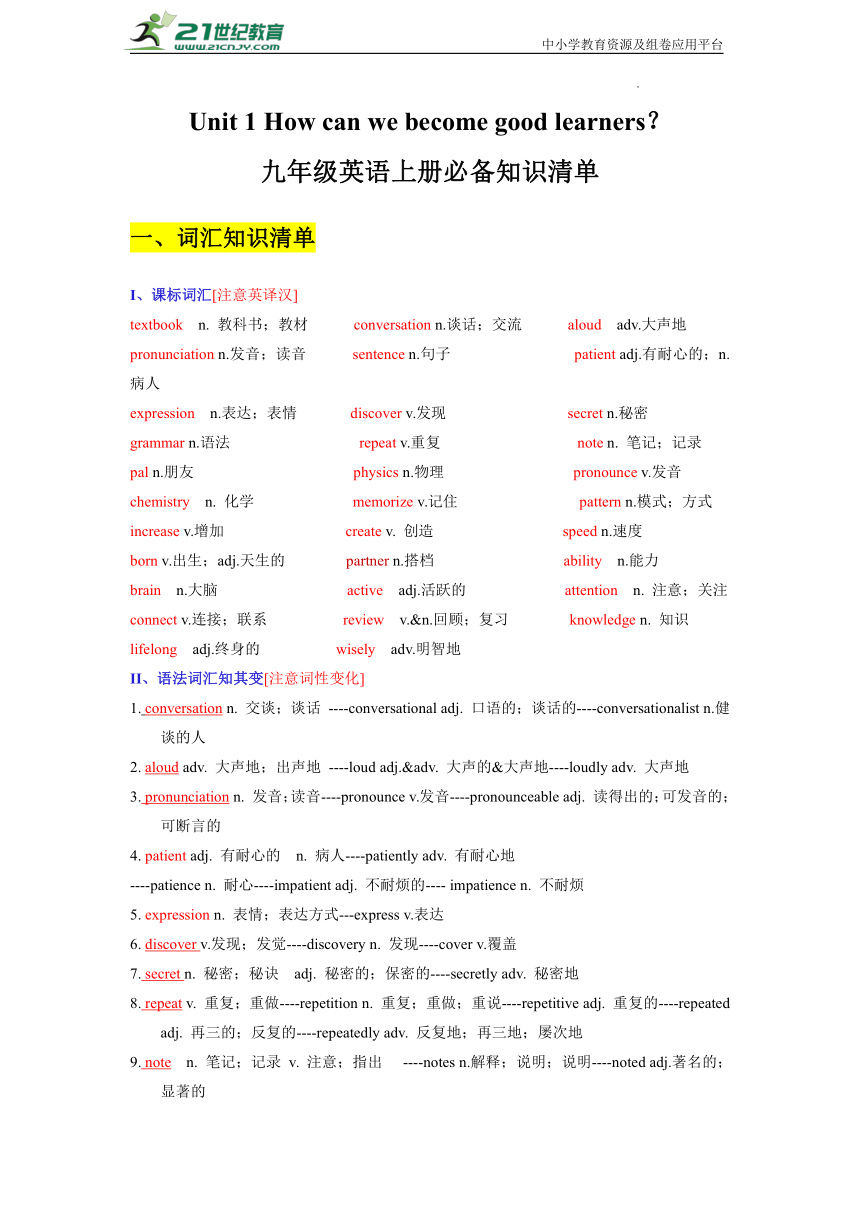
|
|
| 格式 | docx | ||
| 文件大小 | 184.8KB | ||
| 资源类型 | 试卷 | ||
| 版本资源 | 人教新目标(Go for it)版 | ||
| 科目 | 英语 | ||
| 更新时间 | 2024-10-11 00:00:00 | ||
图片预览

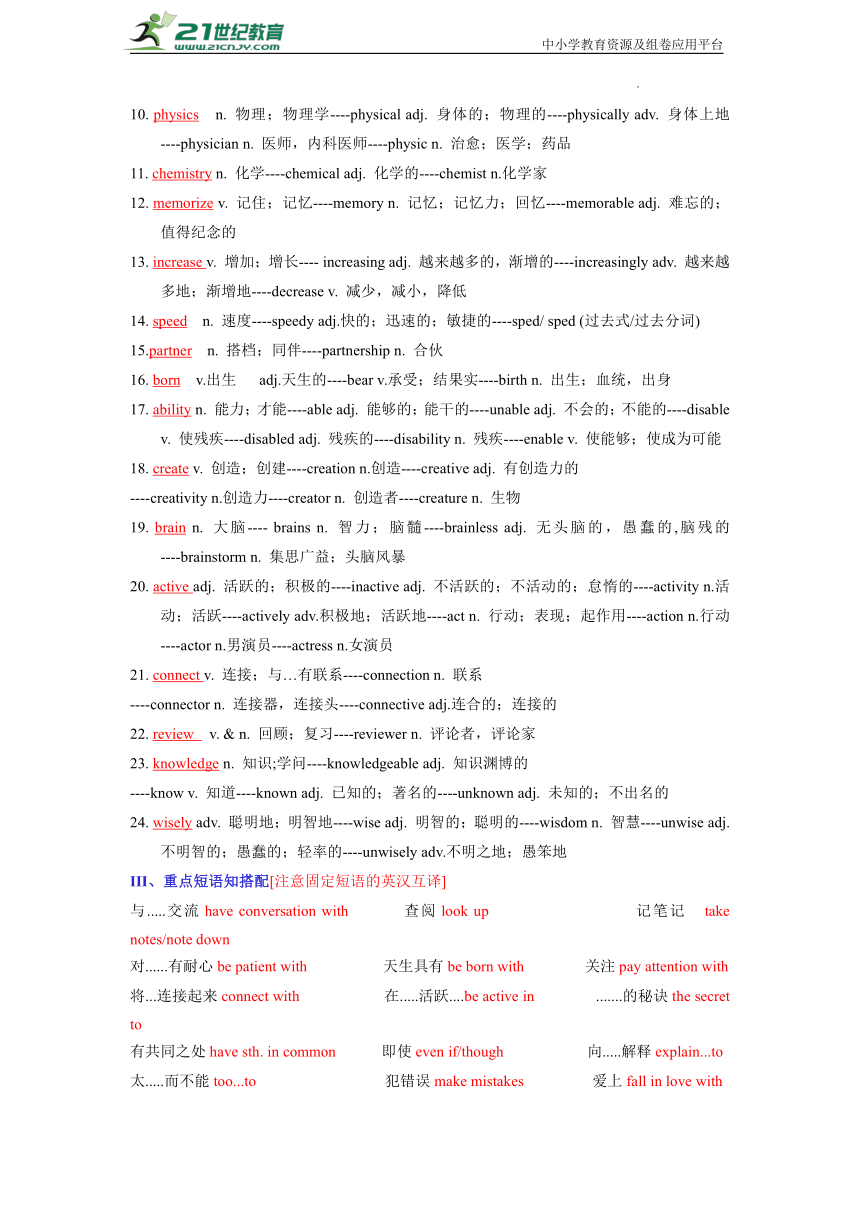
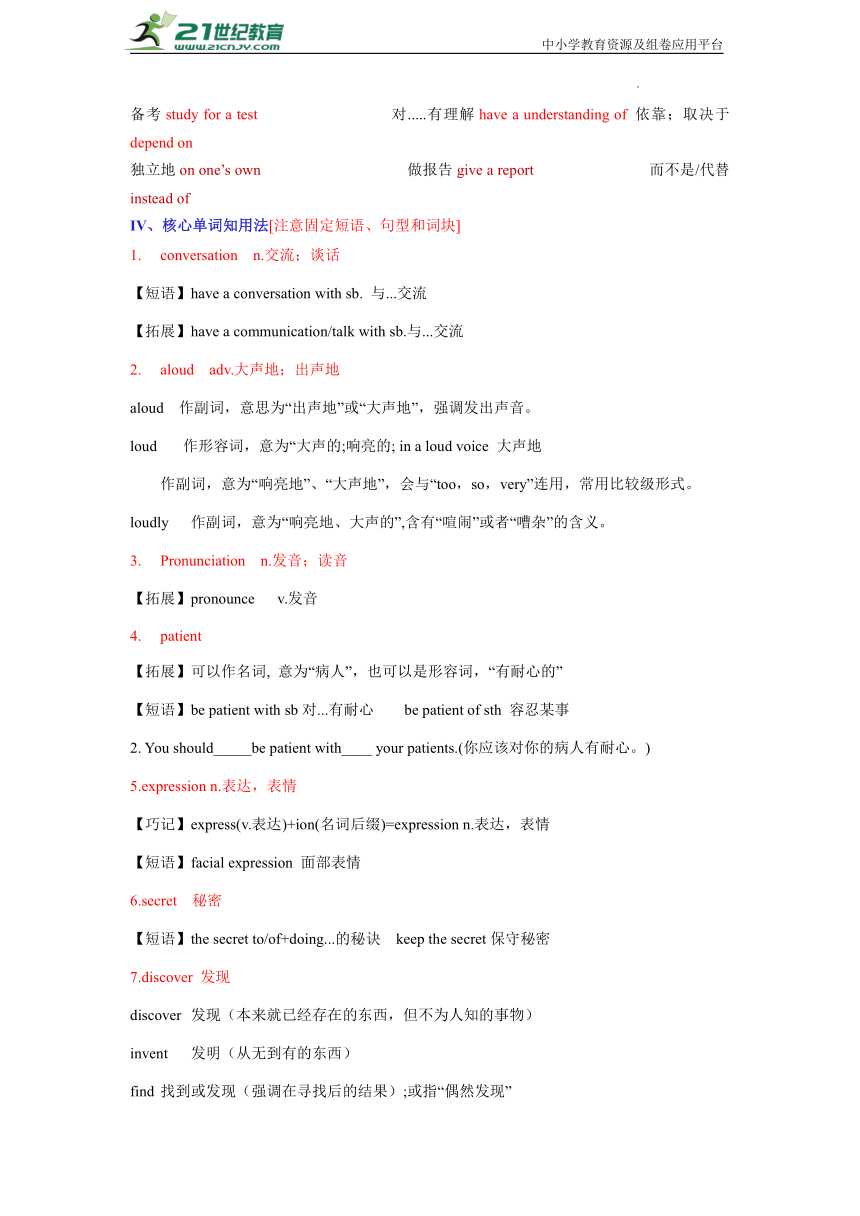
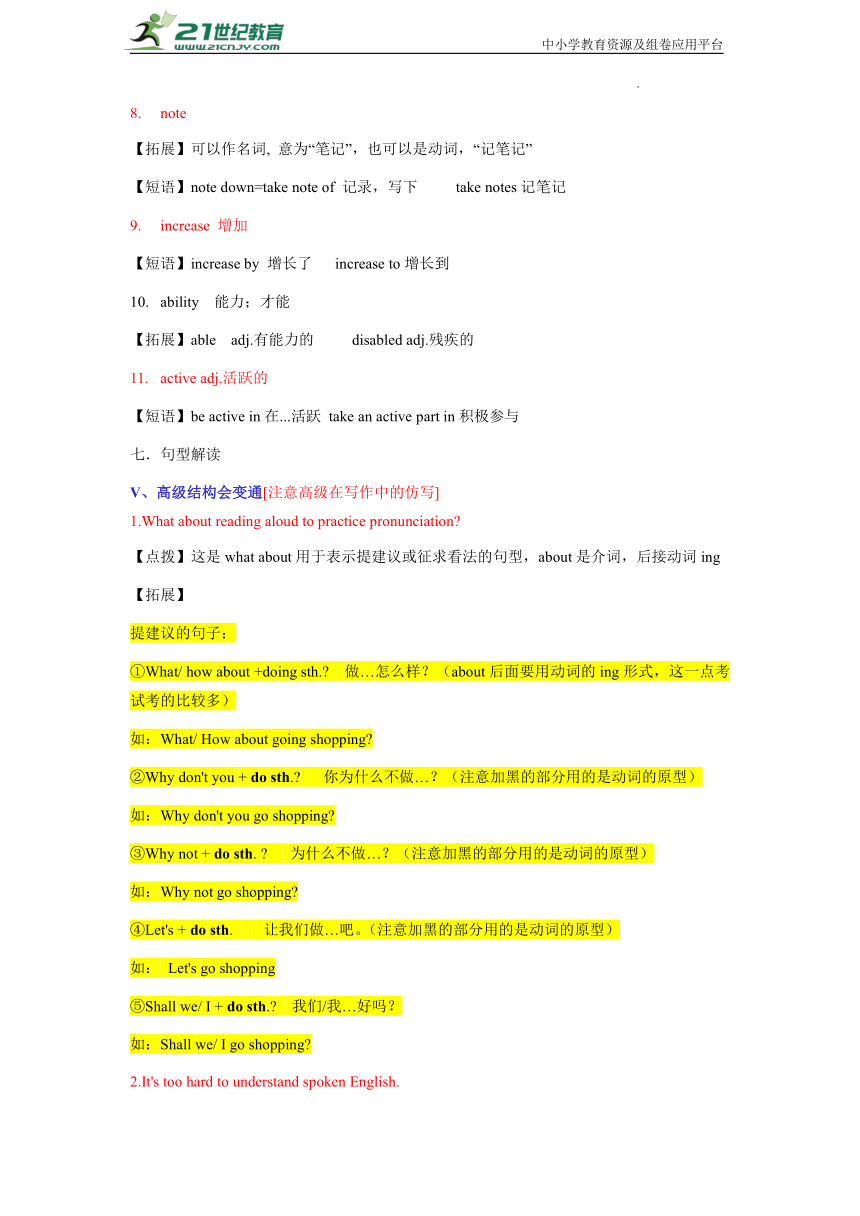
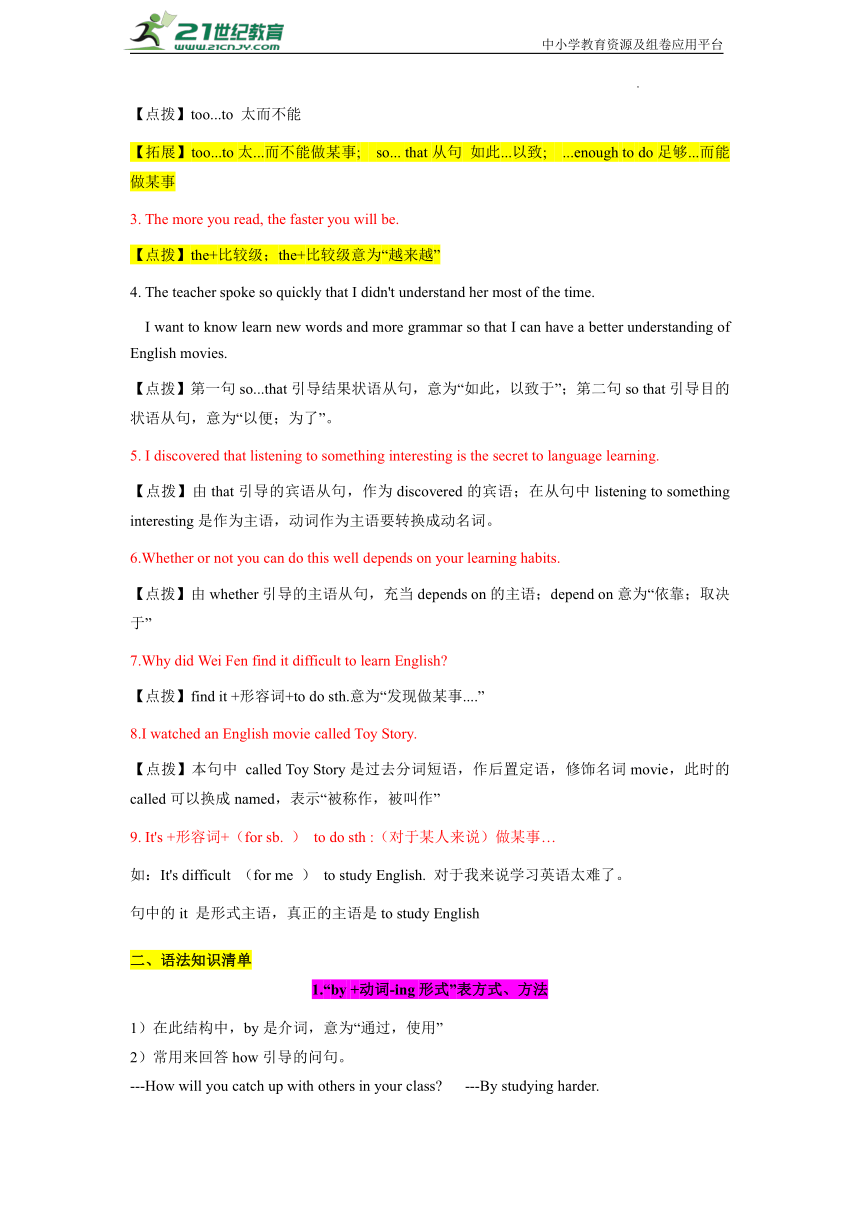
文档简介
中小学教育资源及组卷应用平台
Unit 1 How can we become good learners?
九年级英语上册必备知识清单
一、词汇知识清单
I、课标词汇[注意英译汉]
textbook n. 教科书;教材 conversation n.谈话;交流 aloud adv.大声地
pronunciation n.发音;读音 sentence n.句子 patient adj.有耐心的;n.病人
expression n.表达;表情 discover v.发现 secret n.秘密
grammar n.语法 repeat v.重复 note n. 笔记;记录
pal n.朋友 physics n.物理 pronounce v.发音
chemistry n. 化学 memorize v.记住 pattern n.模式;方式
increase v.增加 create v. 创造 speed n.速度
born v.出生;adj.天生的 partner n.搭档 ability n.能力
brain n.大脑 active adj.活跃的 attention n. 注意;关注
connect v.连接;联系 review v.&n.回顾;复习 knowledge n. 知识
lifelong adj.终身的 wisely adv.明智地
II、语法词汇知其变[注意词性变化]
1. conversation n. 交谈;谈话 ----conversational adj. 口语的;谈话的----conversationalist n.健谈的人
2. aloud adv. 大声地;出声地 ----loud adj.&adv. 大声的&大声地----loudly adv. 大声地
3. pronunciation n. 发音;读音----pronounce v.发音----pronounceable adj. 读得出的;可发音的;可断言的
4. patient adj. 有耐心的 n. 病人----patiently adv. 有耐心地
----patience n. 耐心----impatient adj. 不耐烦的---- impatience n. 不耐烦
5. expression n. 表情;表达方式---express v.表达
6. discover v.发现;发觉----discovery n. 发现----cover v.覆盖
7. secret n. 秘密;秘诀 adj. 秘密的;保密的----secretly adv. 秘密地
8. repeat v. 重复;重做----repetition n. 重复;重做;重说----repetitive adj. 重复的----repeated adj. 再三的;反复的----repeatedly adv. 反复地;再三地;屡次地
9. note n. 笔记;记录 v. 注意;指出 ----notes n.解释;说明;说明----noted adj.著名的;显著的
10. physics n. 物理;物理学----physical adj. 身体的;物理的----physically adv. 身体上地----physician n. 医师,内科医师----physic n. 治愈;医学;药品
11. chemistry n. 化学----chemical adj. 化学的----chemist n.化学家
12. memorize v. 记住;记忆----memory n. 记忆;记忆力;回忆----memorable adj. 难忘的;值得纪念的
13. increase v. 增加;增长---- increasing adj. 越来越多的,渐增的----increasingly adv. 越来越多地;渐增地----decrease v. 减少,减小,降低
14. speed n. 速度----speedy adj.快的;迅速的;敏捷的----sped/ sped (过去式/过去分词)
15.partner n. 搭档;同伴----partnership n. 合伙
16. born v.出生 adj.天生的----bear v.承受;结果实----birth n. 出生;血统,出身
17. ability n. 能力;才能----able adj. 能够的;能干的----unable adj. 不会的;不能的----disable v. 使残疾----disabled adj. 残疾的----disability n. 残疾----enable v. 使能够;使成为可能
18. create v. 创造;创建----creation n.创造----creative adj. 有创造力的
----creativity n.创造力----creator n. 创造者----creature n. 生物
19. brain n. 大脑---- brains n. 智力;脑髓----brainless adj. 无头脑的,愚蠢的,脑残的----brainstorm n. 集思广益;头脑风暴
20. active adj. 活跃的;积极的----inactive adj. 不活跃的;不活动的;怠惰的----activity n.活动;活跃----actively adv.积极地;活跃地----act n. 行动;表现;起作用----action n.行动----actor n.男演员----actress n.女演员
21. connect v. 连接;与…有联系----connection n. 联系
----connector n. 连接器,连接头----connective adj.连合的;连接的
22. review v. & n. 回顾;复习----reviewer n. 评论者,评论家
23. knowledge n. 知识;学问----knowledgeable adj. 知识渊博的
----know v. 知道----known adj. 已知的;著名的----unknown adj. 未知的;不出名的
24. wisely adv. 聪明地;明智地----wise adj. 明智的;聪明的----wisdom n. 智慧----unwise adj. 不明智的;愚蠢的;轻率的----unwisely adv.不明之地;愚笨地
III、重点短语知搭配[注意固定短语的英汉互译]
与.....交流have conversation with 查阅look up 记笔记 take notes/note down
对......有耐心be patient with 天生具有be born with 关注pay attention with
将...连接起来connect with 在.....活跃....be active in .......的秘诀the secret to
有共同之处have sth. in common 即使even if/though 向.....解释explain...to
太.....而不能too...to 犯错误make mistakes 爱上fall in love with
备考study for a test 对.....有理解have a understanding of 依靠;取决于depend on
独立地on one’s own 做报告give a report 而不是/代替instead of
IV、核心单词知用法[注意固定短语、句型和词块]
1. conversation n.交流;谈话
【短语】have a conversation with sb. 与...交流
【拓展】have a communication/talk with sb.与...交流
2. aloud adv.大声地;出声地
aloud 作副词,意思为“出声地”或“大声地”,强调发出声音。
loud 作形容词,意为“大声的;响亮的; in a loud voice 大声地
作副词,意为“响亮地”、“大声地”,会与“too,so,very”连用,常用比较级形式。
loudly 作副词,意为“响亮地、大声的”,含有“喧闹”或者“嘈杂”的含义。
3. Pronunciation n.发音;读音
【拓展】pronounce v.发音
4. patient
【拓展】可以作名词, 意为“病人”,也可以是形容词,“有耐心的”
【短语】be patient with sb对...有耐心 be patient of sth 容忍某事
2. You should_____be patient with____ your patients.(你应该对你的病人有耐心。)
5.expression n.表达,表情
【巧记】express(v.表达)+ion(名词后缀)=expression n.表达,表情
【短语】facial expression 面部表情
6.secret 秘密
【短语】the secret to/of+doing...的秘诀 keep the secret保守秘密
7.discover 发现
discover 发现(本来就已经存在的东西,但不为人知的事物)
invent 发明(从无到有的东西)
find 找到或发现(强调在寻找后的结果);或指“偶然发现”
8. note
【拓展】可以作名词, 意为“笔记”,也可以是动词,“记笔记”
【短语】note down=take note of 记录,写下 take notes记笔记
9. increase 增加
【短语】increase by 增长了 increase to增长到
10. ability 能力;才能
【拓展】able adj.有能力的 disabled adj.残疾的
11. active adj.活跃的
【短语】be active in在...活跃 take an active part in积极参与
七.句型解读
V、高级结构会变通[注意高级在写作中的仿写]
1.What about reading aloud to practice pronunciation
【点拨】这是what about用于表示提建议或征求看法的句型,about是介词,后接动词ing
【拓展】
提建议的句子:
①What/ how about +doing sth. 做…怎么样?(about后面要用动词的ing形式,这一点考试考的比较多)
如:What/ How about going shopping
②Why don't you + do sth. 你为什么不做…?(注意加黑的部分用的是动词的原型)
如:Why don't you go shopping
③Why not + do sth. 为什么不做…?(注意加黑的部分用的是动词的原型)
如:Why not go shopping
④Let's + do sth. 让我们做…吧。(注意加黑的部分用的是动词的原型)
如: Let's go shopping
⑤Shall we/ I + do sth. 我们/我…好吗?
如:Shall we/ I go shopping
2.It's too hard to understand spoken English.
【点拨】too...to 太而不能
【拓展】too...to太...而不能做某事; so... that从句 如此...以致; ...enough to do足够...而能做某事
3. The more you read, the faster you will be.
【点拨】the+比较级;the+比较级意为“越来越”
4. The teacher spoke so quickly that I didn't understand her most of the time.
I want to know learn new words and more grammar so that I can have a better understanding of English movies.
【点拨】第一句so...that引导结果状语从句,意为“如此,以致于”;第二句so that引导目的状语从句,意为“以便;为了”。
5. I discovered that listening to something interesting is the secret to language learning.
【点拨】由that引导的宾语从句,作为discovered的宾语;在从句中listening to something interesting是作为主语,动词作为主语要转换成动名词。
6.Whether or not you can do this well depends on your learning habits.
【点拨】由whether引导的主语从句,充当depends on的主语;depend on意为“依靠;取决于”
7.Why did Wei Fen find it difficult to learn English
【点拨】find it +形容词+to do sth.意为“发现做某事....”
8.I watched an English movie called Toy Story.
【点拨】本句中 called Toy Story是过去分词短语,作后置定语,修饰名词movie,此时的called可以换成named,表示“被称作,被叫作”
9. It's +形容词+(for sb. ) to do sth :(对于某人来说)做某事…
如:It's difficult (for me ) to study English. 对于我来说学习英语太难了。
句中的it 是形式主语,真正的主语是to study English
二、语法知识清单
1.“by +动词-ing形式”表方式、方法
1)在此结构中,by是介词,意为“通过,使用”
2)常用来回答how引导的问句。
---How will you catch up with others in your class ---By studying harder.
易混辨析:
◆by的用法:以...方式、方法,表示传达、传递的方式或媒介
I improve my English by reading a lot.
◆with 的用法:表示借助某种具体的手段或工具
(1) with +工具 We like to write with a pen.
(2)with+人体部位 We see with our eyes.
◆in 的用法:通常与“衣着、声音、书写材料”等名称连用
in+语言 in English 用英语 speak in a soft voice
in a loud voice大声地讲 in red 穿红色的衣服
◆on 的用法: on +电器或媒介 on TV /radio/Internet
by的其他用法
1.by+地点,表示位置, “在...旁边”. Tom sits by the window in the classroom.
2.by+交通工具,表示交通出行方式,意为“乘...;通过...” by bus/bike/train
3.by+时间,表示 ”在...之前;不迟于...”. Mom told him to come back home by 10:00.
4.意为“由...所作” The music by Mozart is famous all over the world.
( 二 )by的固定搭配
by mistake错误地 by accident偶然地 by oneself独自地
by the way 顺便说一下 word by word逐词地 pass by 路过
by hand手工地 by the end of截止到....时间
2.现在完成时
1.概念
表示过去发生的动作对现在造成的影响或结果或表示过去的动作或状态持续到现在。
2.时间状语
1)yet (常用于否定或疑问句中), already (常用于肯定句中),ever (曾经)
2)since+过去时间点/过去时的从句(译为:自从…以来)
3)for+时间段
4)in the past few days,in recent years, so far , over these years
【辨析】since 与for 在现在完成时态中的用法:
since 其后接时间点或时态为一般过去时的句子,表示某事是从什么时候开始的
例:I’ve been a soldier since two years ago.
He has studied very hard since he came to our school.
for 其后接时间段,表示某事持续了多长时间
例:Peter has written six papers for three years.
3.句式结构
肯定句:主语+has/have + done+其它.
否定句:主语+has/have +not+ done+其它.
一般疑问句:Has/ Have+主语+done+其它
肯定回答:Yes,主语+has/have. 否定回答:No,主语+hasn’t/haven’t
例:They have already read this book. They haven’t read this book yet.
4.动词过去分词的规则变化
情况 变形 示例
一般情况 加-ed work-worked visit-visited
以不发音字母e结尾 加-d live-lived
辅音字母加y结尾 把y变i,加-ed study-studied cry-cried
重读闭音节结尾 双写尾字母,再加-ed stop-stopped drop-dropped
5、has gone (to); has been (to); has been (in) 三者的区别。
1. has gone to:表示某人已去了某地,(现未回来)
例:---Where is Tom 汤姆在哪里?
---He has gone to Shanghai. 他已经去了上海。
has been to:表示去过某地,(现已回来)
例:I have been to New York three times so far. 到目前为止,我已经去过纽约三次了。
3. has been in:表示一直呆在某地,常与时间段搭配。
例:I have been in the army for more than 5 years.我在部队已经呆了五年多了。
三、语篇知识清单
话题分析
谈论如何学习
本单元以“怎样学习”为话题,向同学们介绍了许多学习英语的方法,同学们可以根据自身特点找到适合自己学习英语的有效方法。具体到书面表达中,要求同学们会介绍自己学习英语的经验和体会,同时也要求同学们能针对某人在学习英语方面遇到的问题,提出自己的建议来帮助他们解决问题。
描述学习中存在的困惑的常用句型
①have some trouble in doing sth. ②I can't… ③my biggest problem is that… ④I don't know how to… ⑤it's difficult for sb. to do sth. ⑥another thing I find difficult is… ⑦I find it difficult to do sth. ⑧want to improve… ⑨want to have a better understanding of…
提出学习上合理的建议的常用句型
①you can/could…by doing… ②I think you should try to improve your English by… ③what about… ④it's a good idea/way to do… ⑤the best way to…is… ⑥doing sth. is a good way to… ⑦doing sth. is the secret to language learning ⑧you’d better take notes in class. ⑨don’t be afraid of making mistakes.
写作指导
思路点拨
体裁: 应用文
人称: 第二人称
时态: 一般现在时和一般将来时
写作三步法
第1步 开篇点题 I know you want to improve your English and you need some help. There are three good ways to learn English.
第2步 介绍方法 I think you should... if you do this, your brain will...
It is also a good idea to... because...
You could try to improve your English by... This will help you...
第3步 总结收尾 I hope all these will be helpful to you.
写作实操
___________________________________________________________________ ____________________________________________________________________ ____________________________________________________________________
____________________________________________________________________
____________________________________________________________________
参考范文
Dear Li Ming,
I know you want to improve your English and you need some help. There are three good ways to learn English.
I think you should be interested in learning English first. If you do this, your brain will be more active and it’s also easier for you to pay attention to it for a long time. You can connect learning English with something interesting. For example, if you like music or movies, you can listen to English songs or watch English-language movies. It is also a good idea to develop your study skills because it’s not enough to just study hard. You should find the best way you can study. For example, you can take notes by writing down key words or by drawing a mind map. You could try to improve your English by practicing more. This will help you improve your English listening, speaking, writing and so on. Remember, “Practice makes perfect.” You should keep practicing what you’ve learned and you shouldn’t be afraid of making mistakes. No one can succeed overnight.
I hope all these will be helpful to you.
Yours,
Mary
书面表达
练习1.为了交流学习经验,提高学习效率,某英语报社正在举办以"How to Be a Good Learner " 为题的征文比赛。请你根据下列提示,写一篇英语征文稿。
提示:
1. 拥有良好的学习习惯;
2. 经常参加学习小组;
3. 不忘参加体育锻炼。
要求:
1. 必须包括全部要点,可以适当发挥;
2. 80词左右,文章标题已给出,不计入总词数;
3. 文中请勿提及学校和个人的真实信息。
How to Be a Good Learner
____________________________________________________________________________________________________________________________________________________________________________________________________________________________________________________________________________________________________________________________________________________________________________________________________________________________________________________________________________________________________________________________________________________________________________________________________________________________________________________________________
【答案】
How to Be a Good Learner
If you want to be a good learner,having good habits is important. We need to get ready for our lessons before class and always listen carefully in class. After class, we must go over the lessons and finish our homework on time. On the other hand, it's good to study in groups. Students can help each other when they study in groups. At last, although working hard is important, don't forget to do some sports. It's good for you to keep healthy.
(北京)股份有限公司
Unit 1 How can we become good learners?
九年级英语上册必备知识清单
一、词汇知识清单
I、课标词汇[注意英译汉]
textbook n. 教科书;教材 conversation n.谈话;交流 aloud adv.大声地
pronunciation n.发音;读音 sentence n.句子 patient adj.有耐心的;n.病人
expression n.表达;表情 discover v.发现 secret n.秘密
grammar n.语法 repeat v.重复 note n. 笔记;记录
pal n.朋友 physics n.物理 pronounce v.发音
chemistry n. 化学 memorize v.记住 pattern n.模式;方式
increase v.增加 create v. 创造 speed n.速度
born v.出生;adj.天生的 partner n.搭档 ability n.能力
brain n.大脑 active adj.活跃的 attention n. 注意;关注
connect v.连接;联系 review v.&n.回顾;复习 knowledge n. 知识
lifelong adj.终身的 wisely adv.明智地
II、语法词汇知其变[注意词性变化]
1. conversation n. 交谈;谈话 ----conversational adj. 口语的;谈话的----conversationalist n.健谈的人
2. aloud adv. 大声地;出声地 ----loud adj.&adv. 大声的&大声地----loudly adv. 大声地
3. pronunciation n. 发音;读音----pronounce v.发音----pronounceable adj. 读得出的;可发音的;可断言的
4. patient adj. 有耐心的 n. 病人----patiently adv. 有耐心地
----patience n. 耐心----impatient adj. 不耐烦的---- impatience n. 不耐烦
5. expression n. 表情;表达方式---express v.表达
6. discover v.发现;发觉----discovery n. 发现----cover v.覆盖
7. secret n. 秘密;秘诀 adj. 秘密的;保密的----secretly adv. 秘密地
8. repeat v. 重复;重做----repetition n. 重复;重做;重说----repetitive adj. 重复的----repeated adj. 再三的;反复的----repeatedly adv. 反复地;再三地;屡次地
9. note n. 笔记;记录 v. 注意;指出 ----notes n.解释;说明;说明----noted adj.著名的;显著的
10. physics n. 物理;物理学----physical adj. 身体的;物理的----physically adv. 身体上地----physician n. 医师,内科医师----physic n. 治愈;医学;药品
11. chemistry n. 化学----chemical adj. 化学的----chemist n.化学家
12. memorize v. 记住;记忆----memory n. 记忆;记忆力;回忆----memorable adj. 难忘的;值得纪念的
13. increase v. 增加;增长---- increasing adj. 越来越多的,渐增的----increasingly adv. 越来越多地;渐增地----decrease v. 减少,减小,降低
14. speed n. 速度----speedy adj.快的;迅速的;敏捷的----sped/ sped (过去式/过去分词)
15.partner n. 搭档;同伴----partnership n. 合伙
16. born v.出生 adj.天生的----bear v.承受;结果实----birth n. 出生;血统,出身
17. ability n. 能力;才能----able adj. 能够的;能干的----unable adj. 不会的;不能的----disable v. 使残疾----disabled adj. 残疾的----disability n. 残疾----enable v. 使能够;使成为可能
18. create v. 创造;创建----creation n.创造----creative adj. 有创造力的
----creativity n.创造力----creator n. 创造者----creature n. 生物
19. brain n. 大脑---- brains n. 智力;脑髓----brainless adj. 无头脑的,愚蠢的,脑残的----brainstorm n. 集思广益;头脑风暴
20. active adj. 活跃的;积极的----inactive adj. 不活跃的;不活动的;怠惰的----activity n.活动;活跃----actively adv.积极地;活跃地----act n. 行动;表现;起作用----action n.行动----actor n.男演员----actress n.女演员
21. connect v. 连接;与…有联系----connection n. 联系
----connector n. 连接器,连接头----connective adj.连合的;连接的
22. review v. & n. 回顾;复习----reviewer n. 评论者,评论家
23. knowledge n. 知识;学问----knowledgeable adj. 知识渊博的
----know v. 知道----known adj. 已知的;著名的----unknown adj. 未知的;不出名的
24. wisely adv. 聪明地;明智地----wise adj. 明智的;聪明的----wisdom n. 智慧----unwise adj. 不明智的;愚蠢的;轻率的----unwisely adv.不明之地;愚笨地
III、重点短语知搭配[注意固定短语的英汉互译]
与.....交流have conversation with 查阅look up 记笔记 take notes/note down
对......有耐心be patient with 天生具有be born with 关注pay attention with
将...连接起来connect with 在.....活跃....be active in .......的秘诀the secret to
有共同之处have sth. in common 即使even if/though 向.....解释explain...to
太.....而不能too...to 犯错误make mistakes 爱上fall in love with
备考study for a test 对.....有理解have a understanding of 依靠;取决于depend on
独立地on one’s own 做报告give a report 而不是/代替instead of
IV、核心单词知用法[注意固定短语、句型和词块]
1. conversation n.交流;谈话
【短语】have a conversation with sb. 与...交流
【拓展】have a communication/talk with sb.与...交流
2. aloud adv.大声地;出声地
aloud 作副词,意思为“出声地”或“大声地”,强调发出声音。
loud 作形容词,意为“大声的;响亮的; in a loud voice 大声地
作副词,意为“响亮地”、“大声地”,会与“too,so,very”连用,常用比较级形式。
loudly 作副词,意为“响亮地、大声的”,含有“喧闹”或者“嘈杂”的含义。
3. Pronunciation n.发音;读音
【拓展】pronounce v.发音
4. patient
【拓展】可以作名词, 意为“病人”,也可以是形容词,“有耐心的”
【短语】be patient with sb对...有耐心 be patient of sth 容忍某事
2. You should_____be patient with____ your patients.(你应该对你的病人有耐心。)
5.expression n.表达,表情
【巧记】express(v.表达)+ion(名词后缀)=expression n.表达,表情
【短语】facial expression 面部表情
6.secret 秘密
【短语】the secret to/of+doing...的秘诀 keep the secret保守秘密
7.discover 发现
discover 发现(本来就已经存在的东西,但不为人知的事物)
invent 发明(从无到有的东西)
find 找到或发现(强调在寻找后的结果);或指“偶然发现”
8. note
【拓展】可以作名词, 意为“笔记”,也可以是动词,“记笔记”
【短语】note down=take note of 记录,写下 take notes记笔记
9. increase 增加
【短语】increase by 增长了 increase to增长到
10. ability 能力;才能
【拓展】able adj.有能力的 disabled adj.残疾的
11. active adj.活跃的
【短语】be active in在...活跃 take an active part in积极参与
七.句型解读
V、高级结构会变通[注意高级在写作中的仿写]
1.What about reading aloud to practice pronunciation
【点拨】这是what about用于表示提建议或征求看法的句型,about是介词,后接动词ing
【拓展】
提建议的句子:
①What/ how about +doing sth. 做…怎么样?(about后面要用动词的ing形式,这一点考试考的比较多)
如:What/ How about going shopping
②Why don't you + do sth. 你为什么不做…?(注意加黑的部分用的是动词的原型)
如:Why don't you go shopping
③Why not + do sth. 为什么不做…?(注意加黑的部分用的是动词的原型)
如:Why not go shopping
④Let's + do sth. 让我们做…吧。(注意加黑的部分用的是动词的原型)
如: Let's go shopping
⑤Shall we/ I + do sth. 我们/我…好吗?
如:Shall we/ I go shopping
2.It's too hard to understand spoken English.
【点拨】too...to 太而不能
【拓展】too...to太...而不能做某事; so... that从句 如此...以致; ...enough to do足够...而能做某事
3. The more you read, the faster you will be.
【点拨】the+比较级;the+比较级意为“越来越”
4. The teacher spoke so quickly that I didn't understand her most of the time.
I want to know learn new words and more grammar so that I can have a better understanding of English movies.
【点拨】第一句so...that引导结果状语从句,意为“如此,以致于”;第二句so that引导目的状语从句,意为“以便;为了”。
5. I discovered that listening to something interesting is the secret to language learning.
【点拨】由that引导的宾语从句,作为discovered的宾语;在从句中listening to something interesting是作为主语,动词作为主语要转换成动名词。
6.Whether or not you can do this well depends on your learning habits.
【点拨】由whether引导的主语从句,充当depends on的主语;depend on意为“依靠;取决于”
7.Why did Wei Fen find it difficult to learn English
【点拨】find it +形容词+to do sth.意为“发现做某事....”
8.I watched an English movie called Toy Story.
【点拨】本句中 called Toy Story是过去分词短语,作后置定语,修饰名词movie,此时的called可以换成named,表示“被称作,被叫作”
9. It's +形容词+(for sb. ) to do sth :(对于某人来说)做某事…
如:It's difficult (for me ) to study English. 对于我来说学习英语太难了。
句中的it 是形式主语,真正的主语是to study English
二、语法知识清单
1.“by +动词-ing形式”表方式、方法
1)在此结构中,by是介词,意为“通过,使用”
2)常用来回答how引导的问句。
---How will you catch up with others in your class ---By studying harder.
易混辨析:
◆by的用法:以...方式、方法,表示传达、传递的方式或媒介
I improve my English by reading a lot.
◆with 的用法:表示借助某种具体的手段或工具
(1) with +工具 We like to write with a pen.
(2)with+人体部位 We see with our eyes.
◆in 的用法:通常与“衣着、声音、书写材料”等名称连用
in+语言 in English 用英语 speak in a soft voice
in a loud voice大声地讲 in red 穿红色的衣服
◆on 的用法: on +电器或媒介 on TV /radio/Internet
by的其他用法
1.by+地点,表示位置, “在...旁边”. Tom sits by the window in the classroom.
2.by+交通工具,表示交通出行方式,意为“乘...;通过...” by bus/bike/train
3.by+时间,表示 ”在...之前;不迟于...”. Mom told him to come back home by 10:00.
4.意为“由...所作” The music by Mozart is famous all over the world.
( 二 )by的固定搭配
by mistake错误地 by accident偶然地 by oneself独自地
by the way 顺便说一下 word by word逐词地 pass by 路过
by hand手工地 by the end of截止到....时间
2.现在完成时
1.概念
表示过去发生的动作对现在造成的影响或结果或表示过去的动作或状态持续到现在。
2.时间状语
1)yet (常用于否定或疑问句中), already (常用于肯定句中),ever (曾经)
2)since+过去时间点/过去时的从句(译为:自从…以来)
3)for+时间段
4)in the past few days,in recent years, so far , over these years
【辨析】since 与for 在现在完成时态中的用法:
since 其后接时间点或时态为一般过去时的句子,表示某事是从什么时候开始的
例:I’ve been a soldier since two years ago.
He has studied very hard since he came to our school.
for 其后接时间段,表示某事持续了多长时间
例:Peter has written six papers for three years.
3.句式结构
肯定句:主语+has/have + done+其它.
否定句:主语+has/have +not+ done+其它.
一般疑问句:Has/ Have+主语+done+其它
肯定回答:Yes,主语+has/have. 否定回答:No,主语+hasn’t/haven’t
例:They have already read this book. They haven’t read this book yet.
4.动词过去分词的规则变化
情况 变形 示例
一般情况 加-ed work-worked visit-visited
以不发音字母e结尾 加-d live-lived
辅音字母加y结尾 把y变i,加-ed study-studied cry-cried
重读闭音节结尾 双写尾字母,再加-ed stop-stopped drop-dropped
5、has gone (to); has been (to); has been (in) 三者的区别。
1. has gone to:表示某人已去了某地,(现未回来)
例:---Where is Tom 汤姆在哪里?
---He has gone to Shanghai. 他已经去了上海。
has been to:表示去过某地,(现已回来)
例:I have been to New York three times so far. 到目前为止,我已经去过纽约三次了。
3. has been in:表示一直呆在某地,常与时间段搭配。
例:I have been in the army for more than 5 years.我在部队已经呆了五年多了。
三、语篇知识清单
话题分析
谈论如何学习
本单元以“怎样学习”为话题,向同学们介绍了许多学习英语的方法,同学们可以根据自身特点找到适合自己学习英语的有效方法。具体到书面表达中,要求同学们会介绍自己学习英语的经验和体会,同时也要求同学们能针对某人在学习英语方面遇到的问题,提出自己的建议来帮助他们解决问题。
描述学习中存在的困惑的常用句型
①have some trouble in doing sth. ②I can't… ③my biggest problem is that… ④I don't know how to… ⑤it's difficult for sb. to do sth. ⑥another thing I find difficult is… ⑦I find it difficult to do sth. ⑧want to improve… ⑨want to have a better understanding of…
提出学习上合理的建议的常用句型
①you can/could…by doing… ②I think you should try to improve your English by… ③what about… ④it's a good idea/way to do… ⑤the best way to…is… ⑥doing sth. is a good way to… ⑦doing sth. is the secret to language learning ⑧you’d better take notes in class. ⑨don’t be afraid of making mistakes.
写作指导
思路点拨
体裁: 应用文
人称: 第二人称
时态: 一般现在时和一般将来时
写作三步法
第1步 开篇点题 I know you want to improve your English and you need some help. There are three good ways to learn English.
第2步 介绍方法 I think you should... if you do this, your brain will...
It is also a good idea to... because...
You could try to improve your English by... This will help you...
第3步 总结收尾 I hope all these will be helpful to you.
写作实操
___________________________________________________________________ ____________________________________________________________________ ____________________________________________________________________
____________________________________________________________________
____________________________________________________________________
参考范文
Dear Li Ming,
I know you want to improve your English and you need some help. There are three good ways to learn English.
I think you should be interested in learning English first. If you do this, your brain will be more active and it’s also easier for you to pay attention to it for a long time. You can connect learning English with something interesting. For example, if you like music or movies, you can listen to English songs or watch English-language movies. It is also a good idea to develop your study skills because it’s not enough to just study hard. You should find the best way you can study. For example, you can take notes by writing down key words or by drawing a mind map. You could try to improve your English by practicing more. This will help you improve your English listening, speaking, writing and so on. Remember, “Practice makes perfect.” You should keep practicing what you’ve learned and you shouldn’t be afraid of making mistakes. No one can succeed overnight.
I hope all these will be helpful to you.
Yours,
Mary
书面表达
练习1.为了交流学习经验,提高学习效率,某英语报社正在举办以"How to Be a Good Learner " 为题的征文比赛。请你根据下列提示,写一篇英语征文稿。
提示:
1. 拥有良好的学习习惯;
2. 经常参加学习小组;
3. 不忘参加体育锻炼。
要求:
1. 必须包括全部要点,可以适当发挥;
2. 80词左右,文章标题已给出,不计入总词数;
3. 文中请勿提及学校和个人的真实信息。
How to Be a Good Learner
____________________________________________________________________________________________________________________________________________________________________________________________________________________________________________________________________________________________________________________________________________________________________________________________________________________________________________________________________________________________________________________________________________________________________________________________________________________________________________________________________
【答案】
How to Be a Good Learner
If you want to be a good learner,having good habits is important. We need to get ready for our lessons before class and always listen carefully in class. After class, we must go over the lessons and finish our homework on time. On the other hand, it's good to study in groups. Students can help each other when they study in groups. At last, although working hard is important, don't forget to do some sports. It's good for you to keep healthy.
(北京)股份有限公司
同课章节目录
- Unit 1 How can we become good learners.
- Section A
- Section B
- Unit 2 I think that mooncakes are delicious!
- Section A
- Section B
- Unit 3 Could you please tell me where the restroom
- Section A
- Section B
- Unit 4 I used to be afraid of the dark.
- Section A
- Section B
- Unit 5 What are the shirts made of?
- Section A
- Section B
- Review of Units 1-5
- Unit 6 When was it invented?
- Section A
- Section B
- Unit 7 Teenagers should be allowed to choose their
- Section A
- Section B
- Unit 8 It must belong to Carla.
- Section A
- Section B
- Unit 9 I like music that I can dance to.
- Section A
- Section B
- Unit 10 You're supposed to shake hands.
- Section A
- Section B
- Review of Units 6-10
- Unit 11 Sad movies make me cry.
- Section A
- Section B
- Unit 12 Life is full of the unexpected
- Section A
- Section B
- Unit 13 We're trying to save the earth!
- Section A
- Section B
- Unit 14 I remember meeting all of you in Grade 7.
- Section A
- Section B
- Review of Units 11-14
